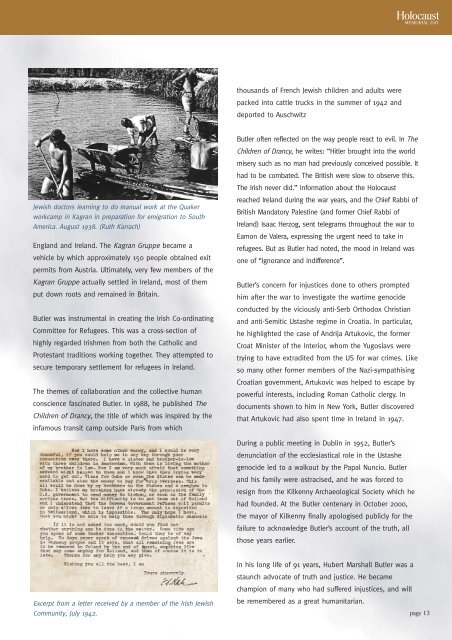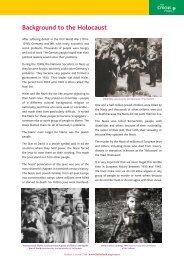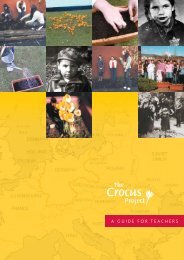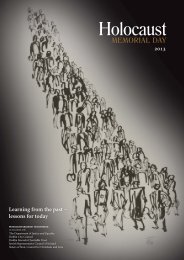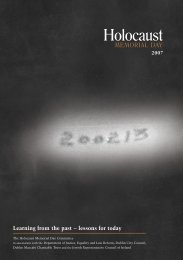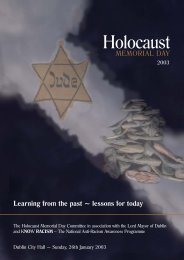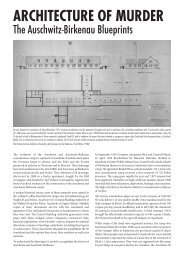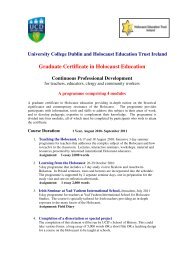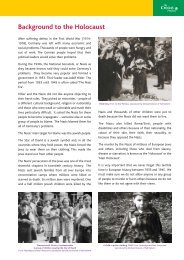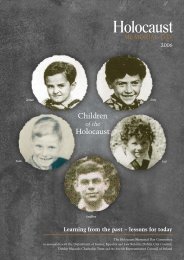Lessons For Today - Holocaust Education Trust of Ireland
Lessons For Today - Holocaust Education Trust of Ireland
Lessons For Today - Holocaust Education Trust of Ireland
Create successful ePaper yourself
Turn your PDF publications into a flip-book with our unique Google optimized e-Paper software.
Jewish doctors learning to do manual work at the Quaker<br />
workcamp in Kagran in preparation for emigration to South<br />
America. August 1938. (Ruth Karrach)<br />
England and <strong>Ireland</strong>. The Kagran Gruppe became a<br />
vehicle by which approximately 150 people obtained exit<br />
permits from Austria. Ultimately, very few members <strong>of</strong> the<br />
Kagran Gruppe actually settled in <strong>Ireland</strong>, most <strong>of</strong> them<br />
put down roots and remained in Britain.<br />
Butler was instrumental in creating the Irish Co-ordinating<br />
Committee for Refugees. This was a cross-section <strong>of</strong><br />
highly regarded Irishmen from both the Catholic and<br />
Protestant traditions working together. They attempted to<br />
secure temporary settlement for refugees in <strong>Ireland</strong>.<br />
The themes <strong>of</strong> collaboration and the collective human<br />
conscience fascinated Butler. In 1988, he published The<br />
Children <strong>of</strong> Drancy, the title <strong>of</strong> which was inspired by the<br />
infamous transit camp outside Paris from which<br />
Excerpt from a letter received by a member <strong>of</strong> the Irish Jewish<br />
Community, July 1942.<br />
thousands <strong>of</strong> French Jewish children and adults were<br />
packed into cattle trucks in the summer <strong>of</strong> 1942 and<br />
deported to Auschwitz<br />
<strong>Holocaust</strong><br />
MEMORIAL DAY<br />
Butler <strong>of</strong>ten reflected on the way people react to evil. In The<br />
Children <strong>of</strong> Drancy, he writes: “Hitler brought into the world<br />
misery such as no man had previously conceived possible. It<br />
had to be combated. The British were slow to observe this.<br />
The Irish never did.” Information about the <strong>Holocaust</strong><br />
reached <strong>Ireland</strong> during the war years, and the Chief Rabbi <strong>of</strong><br />
British Mandatory Palestine (and former Chief Rabbi <strong>of</strong><br />
<strong>Ireland</strong>) Isaac Herzog, sent telegrams throughout the war to<br />
Eamon de Valera, expressing the urgent need to take in<br />
refugees. But as Butler had noted, the mood in <strong>Ireland</strong> was<br />
one <strong>of</strong> “ignorance and indifference”.<br />
Butler’s concern for injustices done to others prompted<br />
him after the war to investigate the wartime genocide<br />
conducted by the viciously anti-Serb Orthodox Christian<br />
and anti-Semitic Ustashe regime in Croatia. In particular,<br />
he highlighted the case <strong>of</strong> Andrija Artukovic, the former<br />
Croat Minister <strong>of</strong> the Interior, whom the Yugoslavs were<br />
trying to have extradited from the US for war crimes. Like<br />
so many other former members <strong>of</strong> the Nazi-sympathising<br />
Croatian government, Artukovic was helped to escape by<br />
powerful interests, including Roman Catholic clergy. In<br />
documents shown to him in New York, Butler discovered<br />
that Artukovic had also spent time in <strong>Ireland</strong> in 1947.<br />
During a public meeting in Dublin in 1952, Butler’s<br />
denunciation <strong>of</strong> the ecclesiastical role in the Ustashe<br />
genocide led to a walkout by the Papal Nuncio. Butler<br />
and his family were ostracised, and he was forced to<br />
resign from the Kilkenny Archaeological Society which he<br />
had founded. At the Butler centenary in October 2000,<br />
the mayor <strong>of</strong> Kilkenny finally apologised publicly for the<br />
failure to acknowledge Butler’s account <strong>of</strong> the truth, all<br />
those years earlier.<br />
In his long life <strong>of</strong> 91 years, Hubert Marshall Butler was a<br />
staunch advocate <strong>of</strong> truth and justice. He became<br />
champion <strong>of</strong> many who had suffered injustices, and will<br />
be remembered as a great humanitarian.<br />
page 13


